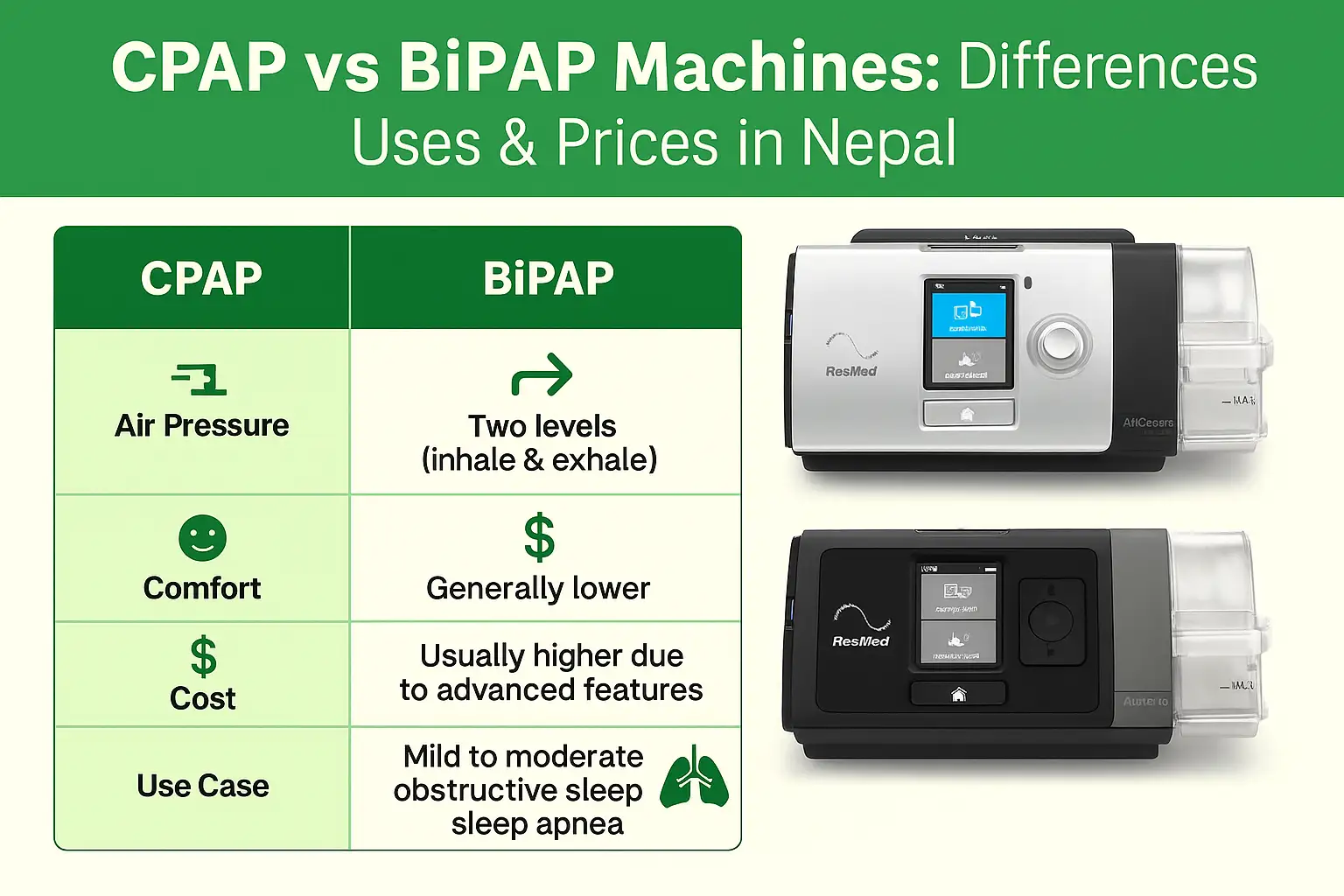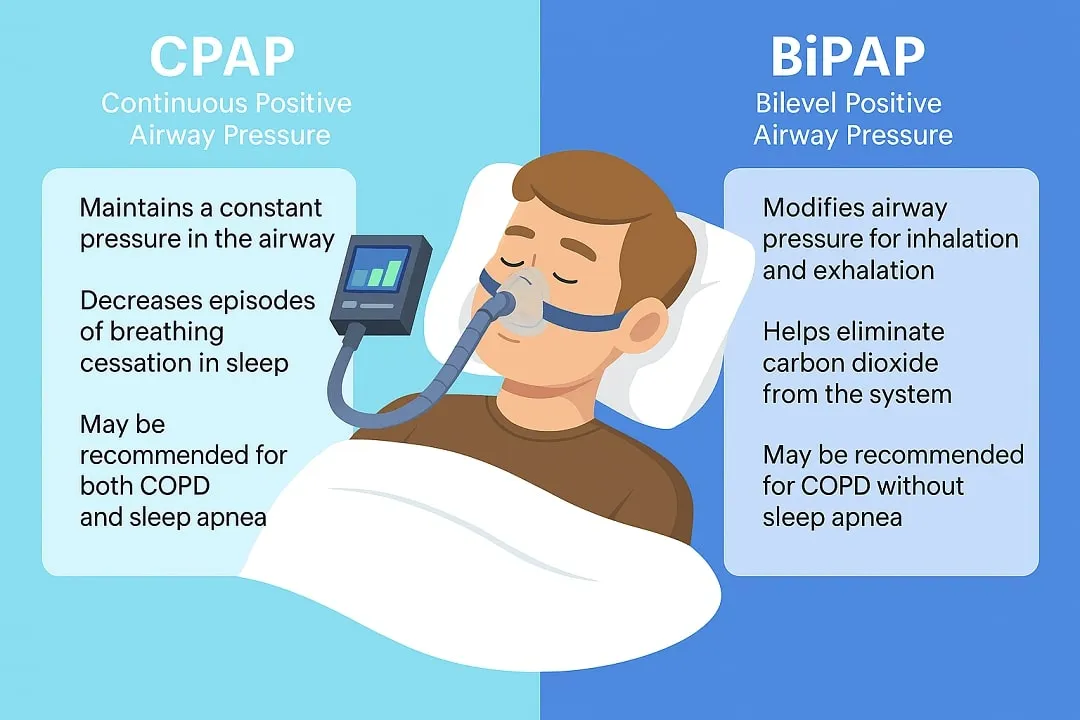Sleep disorders like sleep apnea affect thousands of people in Nepal, causing poor sleep quality, fatigue, and even serious health issues. Two of the most effective treatments are CPAP (Continuous Positive Airway Pressure) and BiPAP (Bilevel Positive Airway Pressure) machines.
Both help you breathe easier at night — but they work in slightly different ways. This guide explains those differences so you can choose the right one for your needs, compare BIPAP machine price in Nepal and CPAP machine price in Nepal, and know where to get the best CPAP machine in Nepal.
How These Machines Work – The Science in Brief
When you sleep, your airway can narrow or collapse, especially if you have sleep apnea. This causes pauses in breathing, drops in oxygen levels, and frequent wake-ups.
CPAP and BiPAP machines use gentle pressurized air to keep your airway open, preventing oxygen drops and helping you breathe steadily through the night.
What is a CPAP Machine?
CPAP delivers a steady, continuous air pressure through a mask. It’s often the first recommendation for people diagnosed with obstructive sleep apnea.
Benefits of CPAP Machines:
- Simple to use and maintain
- Effective for mild to moderate sleep apnea
- Reduces snoring and improves sleep quality
- Usually more affordable than BiPAP
Best For:
- Mild to moderate obstructive sleep apnea
- Chronic snoring
- Breathing obstruction during sleep
What is a BiPAP Machine?
BiPAP delivers two different pressure levels — higher pressure when inhaling (IPAP) and lower pressure when exhaling (EPAP). This makes breathing feel more natural for some users.
Benefits of BiPAP Machines:
- Easier to exhale than with CPAP
- Suitable for higher pressure needs
- Helpful for COPD, central sleep apnea, or neuromuscular conditions
- Often comes with advanced comfort settings
Best For:
- Severe or complex sleep apnea
- Difficulty tolerating CPAP pressure
- Respiratory conditions requiring varied support
CPAP vs. BiPAP – Key Differences
| Feature | CPAP Machine | BiPAP Machine |
|---|---|---|
| Air Pressure | Constant | Two levels (inhale/exhale) |
| Comfort | Good for most users | Better for pressure-sensitive users |
| Cost | Lower | Higher due to advanced features |
| Best For | Mild–moderate OSA | Severe apnea, COPD, central apnea |

Pros & Cons Comparison
CPAP Machine
Pros
- Lower price point – budget-friendly for most buyers in Nepal
- Proven effectiveness for mild to moderate obstructive sleep apnea
- Easy to use, even for first-time users
- Compact models available for travel
Cons
- Fixed air pressure can feel uncomfortable at first
- Less adaptable for changing breathing patterns
- May require an adjustment period to sleep comfortably
- Can cause nasal dryness or irritation without a humidifier
BiPAP Machine
Pros
- Two pressure settings make breathing easier for many users
- Ideal for severe sleep apnea, COPD, or central apnea
- Advanced comfort features like ramp-up pressure and humidifiers
- Better tolerance for long-term nightly use
Cons
- Higher cost compared to CPAP
- Slightly larger and heavier units (less portable)
- More complex settings – may require professional setup
- Some models may produce a faint pressure change noise
Frequently Asked Questions (FAQ)
Q1: Which machine is quieter?
Modern CPAP and BiPAP machines are designed to be very quiet, but BiPAP units may produce slightly more noise due to complex pressure changes.
Q2: Can I use them without a prescription in Nepal?
In most cases, you can buy them directly in Nepal, but it’s strongly recommended to get a doctor’s evaluation first.
Q3: Do I need a humidifier?
A humidifier can prevent dryness in your nose and throat, especially in winter. Many CPAP and BiPAP machines include built-in humidifiers.
Prices of CPAP & BiPAP Machines in Nepal
- CPAP Machines Price in Nepal → More affordable, starting from entry-level models to premium ones with comfort features.
- BIPAP Machines Price in Nepal → Higher price range due to advanced pressure control and medical-grade use.
👉 Explore the latest models and prices here:
BIPAP & CPAP Machines in Nepal
How to Decide – Quick Checklist
✔ Do you have mild to moderate sleep apnea? → CPAP might be enough
✔ Do you have severe or complex breathing issues? → Consider BiPAP
✔ Do you have trouble exhaling against pressure? → BiPAP may be more comfortable
✔ Is budget your main concern? → CPAP is usually more affordable
Final Thoughts
Both CPAP and BiPAP machines can transform your sleep and health. The right choice depends on your medical needs, comfort preferences, and budget. Always consult a healthcare provider before buying.
If you’re ready to compare best CPAP machine in Nepal and best BiPAP machine, check models, and see updated prices:
👉 BIPAP & CPAP Machines in Nepal
